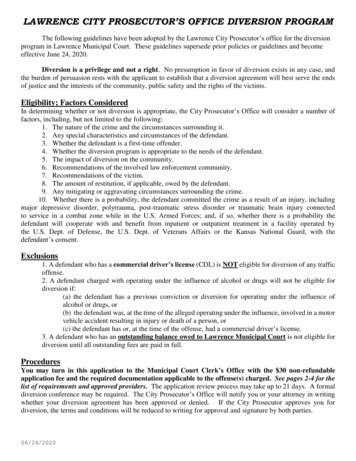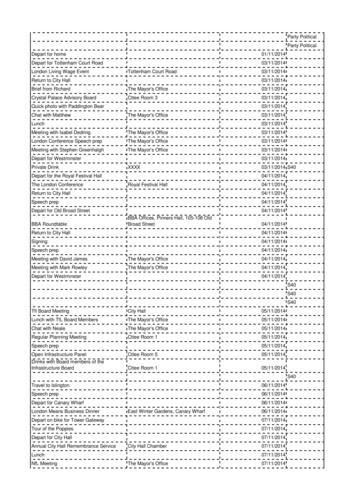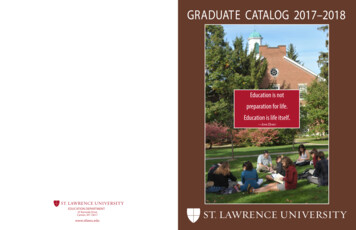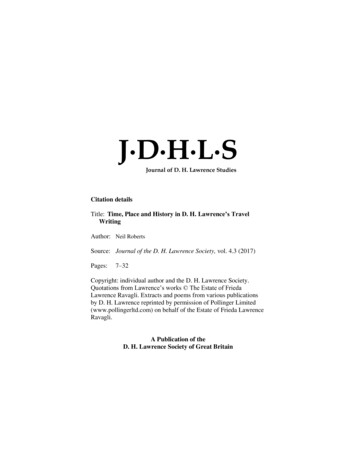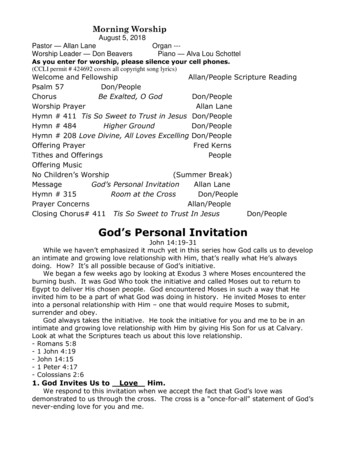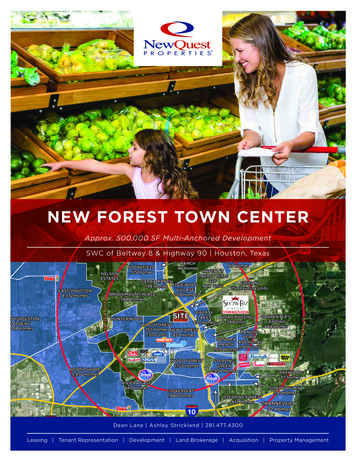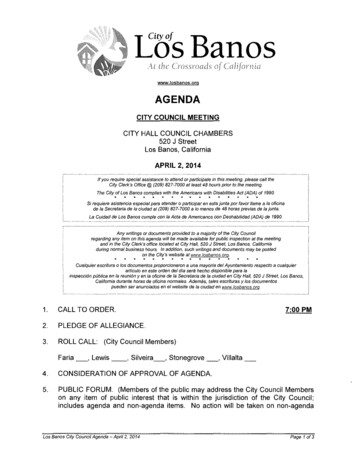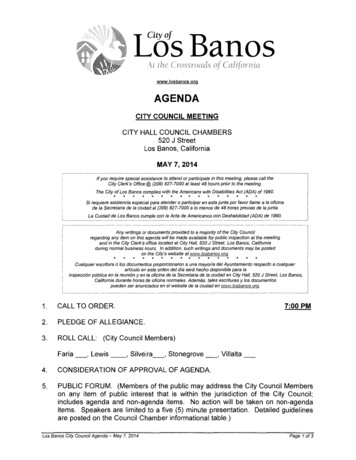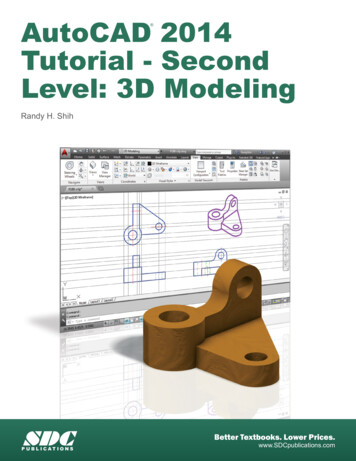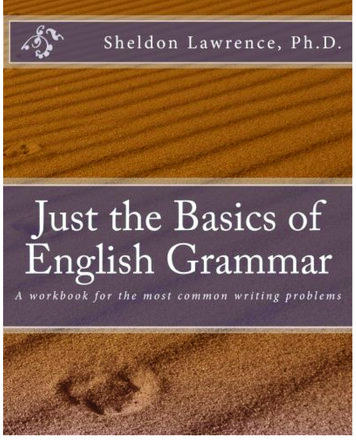
Transcription
Sheldon Lawrence, Ph.D. .comAvailable at Amazon.com
Table of ContentsMeet the Sentence 01Building a Sentence 11Fragments 16Run-on Sentences 23Commas 28Confused Words 45Commonly Misspelled Words 56Shifts in Time 62Parallel Structure 66Problems with Pronouns 76Capitalization 86Apostrophes 93Subject – Verb Agreement 98Other Punctuation 104Verb Power 111Sentence Variety 117Awkward Sentences 120Wordy Sentences 126Quotations 131
Introduction: Effective and ineffective writingUnfortunately, good writing is not a matter of learning a set of rules and then followingthose rules meticulously. Writing is art, and all of the great writers have occasionallybroken the rules of grammar and punctuation in order to achieve a desired effect. The rulesand tips in this book will only make sense as you develop an “ear” for good writing. Whenexperienced writers sit down to write, they do not have a list of rules in their head, and thengo about constructing sentences according to those rules. Instead, they know how goodwriting “sounds.” Through a lifetime of reading, they have developed an intuitive senseof what sounds right and what doesn’t sound right. The rules can help during revision tostrengthen clarity and make easier reading, but knowing rules alone does not make a goodwriter.Having said that, the rules of grammar, punctuation, style, and usage are often the thingsby which readers will judge you. You may have original and insightful things to say, butyour meaning will be lost if your sentences are riddled with errors, awkward phrasing,misplaced punctuation, and incorrectly used words.This book will help you strengthen the clarity of your ideas by helping you improve thegrammar, punctuation, and style of your prose. Sometimes this is accomplished throughchoosing and arranging the right words. Sometimes it’s accomplished by using punctuationto separate “chunks” of thought. And sometimes it’s about digging deeper to find out whatyou really want to say. Most often, all three of these components work together as youwrite and revise your work.There are a dizzying number of books about grammar, style, and editing. In my years ofteaching writing, the concepts covered in this text represent those that most often plaguestudent writing. This text does not go into great detail about the various exceptions anddisagreements in the study of grammar. If you desire such detail, you have many goodbooks to choose from. If you want just the basics, then this workbook will give you the toolsyou need to improve your grammar and style in the most straightforward way possible.
Meet the SentenceParts of speechSometimes grammar books throw around a lot of fancy terms, but in reality, sentences arepretty simple things. Think of a sentence as a cake. It only takes a few simple ingredientsto make a cake—flour, sugar, eggs, water. But you can also add all sorts of things to thecake to make it more interesting and delicious.A sentence only needs two basic ingredients: a noun and a verb.Dogs run.Dogs is a noun. Run is a verb.Everything else tacked onto the sentence just adds information and detail.Dogs run around whenever they are let off of their leashes.In this section, we’ll briefly review the ingredients of a sentence; these are referred to asthe “parts of speech.” Some parts of speech are essential to building sentences; these arethe nouns (or pronouns) and verbs. Others are like frosting and decorations on a cake—they aren’t absolutely essential to create a sentence, but they add information, flavor, andcharacter.VerbsThe most basic ingredient in the sentence is a verb. Action verbs indicate what is happening or being done. There are hundreds of different action verbs.Action verb: George eats candy.Another kind of verb, called a linking verb, functions like an equals sign.Linking verb: George seems nice. (George nice)
2 Meet the Sentence“Be” verbs also act as linking verbs by leveling out the sentence like an equal sign. Thereare only eight be verbs: be, being, been, was, were, is, am, are.Be verb: George is quiet. (George quiet)NounsNouns indicate people, places, things, ideas, and emotions.carpenter, officer, lake, tree, boat, democracy, anger, happinessNouns that refer to specific things are called proper nouns.Jennifer, Yellowstone, Lake Tahoe, Titanic, MicrosoftPronounsPronouns can replace nouns to avoid the awkward repetition of the same noun. Here is asentence without pronouns.I like my car when my car has just been washed because my car’s bright redpaint shines in the sun.Now read the sentence with pronouns. I like my car when it has just been washed because its bright red paint shines inthe sun.The pronoun “it” stands in for “car” to make the sentence less tiresome.Common PronounsYou don’t need to worry about the terminology, but read through the lists below to get a sense ofthe different types of pronouns and how they could replace some other noun.Personal pronouns: I, me, my, mine, you, your, yours, he, she, it, him, her, his,its, we, us, our, ours, you, your, yours, they, them, their, theirs.Demonstrative pronouns: this, that, these, thoseRelative pronouns: who, whom, whose, which, thatIndefinite pronouns: another, anybody, anything, everyone, nobody, someone,both, many, any, most, some
Meet the Sentence 3AdjectivesAdjectives are words that describe or “modify” nouns and pronouns. If someone saysa car has been modified, you know it has been enhanced or dressed up. In relation tonouns, adjectives usually describe “which one,” “how many,” or “what kind.”warm coatred carsilly personobnoxious child seven cookiesAdverbsAdverbs are kind of like adjectives in that they modify or describe another word, but theymodify verbs, adjectives, and other adverbs. Adverbs answer the following questions:How? He ate slowly.When? We will eat soon.Where? I want to eat here.How often? Let’s eat frequently.To what extent? We will eat enough.PrepositionsPrepositions describe the “position” or relationship between words and ideas in a sentence. Review the following list of common prepositions and notice how most indicateposition in time or owardunderuntilupwithwithinwithout
4 Meet the SentencePrepositions are always followed by nouns. This combination is called a prepositionalphrase.among the treesinto the carduring my lunch breakfrom my grandmotherConjunctionsConjunctions join (or “conjoin”) words or parts of a sentence. Two important types ofconjunctions are coordinating conjunctions and subordinating conjunctions.The coordinating conjunctions are for, and, nor, but, or, yet, so. (Use the word fanboysto remember these conjunctions.)I hate snowboarding, but I love skiing.I have not seen the movie, so you are ruining it for me.Note: The word “for” can act as both a preposition and a coordinating conjunction. It isa conjunction when it means “because” or “since” and a preposition all other times. Theuse of “for” as a conjunction is somewhat archaic.Conjunction: She left her coat, for it was very hot outside.Preposition: I waited in the lobby for two hours.There are many subordinating conjunctions; the following list provides a few of the mostcommon.afteralthoughasas long asbecausebeforeeven ereverwhile
Meet the Sentence 5Notice how these words can join two parts of a sentence.I cannot go swimming because I just ate a huge meal.People had to look up information in the library before the internet was developed.When a sentence begins with a subordinating conjunction, a comma is used where thefirst clause ends (see “Building a Sentence”).Because I just ate a huge meal, I cannot go swimming.Before the internet was developed, people had to look up information in a library.InterjectionsInterjections express surprise, concern, or other strong emotions. They stand alone orusually come at the beginning of sentences. Interjections should not be used much, if atall, in formal writing. Common interjections are hey, wow, ouch, well, great, oh, yeah,whoa.Hey, get over here.Great! The plans are coming together.Well, I guess that’s the way it goes.Meet the Sentence–Exercise AUnderline the verbs in the following sentences.1. George loves baseball and plays it every day.2. His team lost the game last week, but George maintains a good attitude.3. He believes that whenever he loses, he learns a different lesson.4. Because he has such a good attitude, he is never a sore loser, unlike some ofhis teammates who only play to win.
6 Meet the SentenceMeet the Sentence–Exercise BUnderline the nouns in the following sentences.1. The cafeteria lunch is never very good at the local school.2. Mary is trying to make a petition so the school board will change the food.3. She wants there to be a menu with many options, such as salads, pasta,grilled meat, and fruits.4. Students usually agree with Mary, but some want more desserts, such ascheesecake, ice cream, and pie.Meet the Sentence–Exercise CUnderline the pronouns in the following sentences.1. Finding good study habits is hard for me because I am so easily distracted.2. It is even harder to study because I have a roommate who plays his drums allday long.3. Any time I start doing my work, he will suddenly start pounding away atthem.4. This is not going to work for me, but I am too shy to tell him to stop.Meet the Sentence–Exercise DUnderline the adjectives in the following sentences.1. The first day we went to Yellowstone was beautiful and sunny.2. We saw a huge buffalo resting on the dusty ground and a brown bear grazingon a distant mountain.3. On our way home, inky black clouds gathered in the sky, and rumbling thunder shook our car.4. I didn’t know that such a peaceful day could turn so ugly and frightening.
Meet the Sentence 7Meet the Sentence–Exercise EUnderline the adverbs in the following sentences.1. There is a creek that lazily winds its way behind my parent’s house.2. It is home to many snails that stubbornly latch on to the slimy rocks.3. Whenever I walk down the creek, I usually try to avoid the snails by carefullystepping around them.4. But there are so many of them that, regrettably, I sometimes crush a few.Meet the Sentence–Exercise FUnderline the prepositions in the following sentences.1. Last week, my friends and I decided to get tickets for a movie premiere beforethey were all sold out.2. Despite the long line, we got our tickets, and last night we went to the midnight premiere.3. We got to the theater two hours before the movie started since we wanted toget good seats.4. During the movie, I fell asleep, but it wasn’t that great anyway.Meet the Sentence–Exercise GUnderline the conjunctions in the following sentences.1. The library in my neighborhood has great librarians, but it is very small.2. Even though they have limited funds, they always hold fun events for thecommunity.3. Because the events always introduce me to great books, I always try to go andbring my family.4. If the library receives more funds, they’ll be able to expand their collection, soI try to donate whenever I have a little extra cash.
8 Meet the SentenceMeet the Sentence–Exercise HUnderline the interjections in the following sentences.1. Hey, Stacie.2. Wow! You look nice.3. Well, are you ready for our date?4. Oh, I didn’t realize you were thinking of this as a date.Answer Key: Meet the Sentence–Exercise A1. George loves baseball and plays it every day2. His team lost the game last week, but George maintains a good attitude.3. He believes that whenever he loses, he learns a different lesson.4. Because he has such a good attitude, he is never a sore loser, unlike some ofhis teammates who only play to win.Answer Key: Meet the Sentence–Exercise B1. The cafeteria lunch is never very good at the local school.2. Mary is trying to make a petition so the school board will change the food.3. She wants there to be a menu with many options, such as salads, pasta,grilled meat, and fruits.4. Students usually agree with Mary, but some want more desserts, such ascheesecake, ice cream, and pie.
Meet the Sentence 9Answer Key: Meet the Sentence–Exercise C1. Finding good study habits is hard for me because I am so easily distracted.2. It is even harder to study because I have a roommate who plays his drums allday long.3. Any time I start doing my work, he will suddenly start pounding away atthem.4. This is not going to work for me, but I am too shy to tell him to stop.Answer Key: Meet the Sentence–Exercise D1. The first day we went to Yellowstone was beautiful and sunny.2. We saw a huge buffalo resting on the dusty ground and a brown bear grazingon a distant mountain.3. On our way home, inky black clouds gathered in the sky, and rumbling thunder shook our car.4. I didn’t know that such a peaceful day could turn so ugly and frightening.Answer Key: Meet the Sentence–Exercise E1. There is a creek that lazily winds its way behind my parent’s house.2. It is home to many snails that stubbornly latch on to the slimy rocks.3. Whenever I walk down the creek, I usually try to avoid the snails by carefullystepping around them.4. But there are so many of them that, regrettably, I sometimes crush a few.
10 Meet the SentenceAnswer Key: Meet the Sentence–Exercise F1. Last week, my friends and I decided to get tickets for a movie premiere beforethey were all sold out.2. Despite the long line, we got our tickets, and last night we went to the midnight premiere.3. We got to the theater two hours before the movie started since we wanted toget good seats.4. During the movie, I fell asleep, but it wasn’t that great anyway.Answer Key: Meet the Sentence–Exercise G1. The library in my neighborhood has great librarians, but it is very small.2. Even though they have limited funds, they always hold fun events for thecommunity.3. Because the events always introduce me to great books, I try to go and bringmy family.4. If the library receives more funds, they’ll be able to expand their collection, soI try to donate whenever I have a little extra cash.Answer Key: Meet the Sentence–Exercise H1. Hey, Stacie.2. Wow! You look nice.3. Well, are you ready for our date?4. Oh, I didn’t realize you were thinking of this as a date.
Building a SentenceAs stated in the previous chapter, a sentence only requires a verb, and then a noun orpronoun to “do” the action of the verb. Nouns or pronouns that function in this capacityare called the subject of the sentence.Dogs eat.This is a complete sentence. It has a subject, a verb, and it expresses a complete thought.This simple subject verb construction forms the core of all sentences. Anything we tackon is just a nice addition.Let’s add a little more information. What do dogs eat?Dogs eat hamburgers.We just added another noun that tells us what dogs eat. This is called the object of thesentence. Where the subject is the “doer” of the verb, the object is the “receiver” of thataction.Let’s say something about what kind of dogs. In other words, let’s add an adjective.The skinny dogs eat hamburgers.Now, let’s say something about how the dogs eat the hamburgers. In other words, let’sdescribe or modify the verb with an adverb.The skinny dogs eat hamburgers slowly.Where does this eating happen? We can add a prepositional phrase that locates this sentence in time or space.The skinny dogs eat hamburgers slowly at the table.Imagine the next sentence in this line of thought looking like this:Their owners don’t seem to mind.
12 Building a SentenceThese two sentences can stand alone as complete thoughts. A group of words that contain a subject and a verb and express a complete thought is called an independent clause.We can let these independent clauses stand alone as sentences, or we can also choose tocombine them with a conjunction. A coordinating conjunction would put the two sentences in a kind of equal relationship.The skinny dogs eat hamburgers slowly at the table, and their owners don’t seemto mind.If we added a subordinating conjunction, the second sentence would become subordinateor dependent on the first.The skinny dogs eat hamburgers slowly at the table because their owners don’tseem to mind.The second sentence would then be called a dependent clause, while the first one is stillan independent clause.Sentences will often begin with the dependent clause and put the independent clause onthe end. When this occurs, a comma is placed at the end of the dependent clause.Because their owners don’t seem to mind, the skinny dogs eat hamburgers slowly at the table.Just for fun, let’s keep building this sentence to make it increasingly complex. We’ll usethe construction with the coordinating conjunction and add another dependent clausewith a subordinating conjunction.The skinny dogs eat hamburgers slowly at the table, and their owners don’t seemto mind as long as they use good manners.What we have here are basically three different clauses strung together. Each clausecontains a subject and a verb. The conjunctions that join these clauses indicate their relationship to one another.The skinny dogs eat hamburgers slowly at the table.Their owners don’t seem to mind.They use good manners.A phrase is a group of related words that lack a subject, a verb, or both. Phrases cannever stand alone as complete sentences. Remember that “at the table” is a prepositionalphrase. Let’s tack on a follow-up phrase to this sentence separated by a comma.The skinny dogs eat hamburgers slowly at the table, and their owners don’t seemto mind as long as they use good manners, especially when dining with guests.
Building a Sentence 13Let’s add information about the owners. We’ll interrupt the flow of the sentence by inserting the owner’s names. Because this information interrupts the sentence, it will require commas.The skinny dogs eat hamburgers slowly at the table, and their owners, Pat andJohn, don’t seem to mind as long as they use good manners, especially when dining with guests.We can add more information about the guests.The skinny dogs eat hamburgers slowly at the table, and their owners, Pat andJohn, don’t seem to mind as long as they use good manners, especially when dining with guests visiting from foreign countries where things like dogs eating attables is considered unusual and even impolite.The new information about the guests actually contains additional clauses, phrases, andadjectives. We can also experiment with different constructions to see what works best.Using good manners so as not to offend guests from foreign countries, Pat andJohn’s skinny dogs eat hamburgers slowly at the table, a practice Pat and Johndon’t seem to mind.The point of this exercise is to demonstrate how a simple noun and a verb can serve asthe foundation for complex sentences just by adding additional clauses, conjunctions,phrases, adjectives, adverbs, etc. Of course, you don’t want to get carried away with simply adding stuff to a sentence. Short and simple sentences belong in good writing just asmuch as complex ones.
14 Building a SentenceBuilding a Sentence–Exercise AUsing the “dogs eat” example as a model, practice starting with a simple clause (subject verb)to create an increasingly complex sentence using the steps below. (Remember that in real writing, not all sentences must contain all the parts of speech or combine clauses. This is just anexercise to introduce you to the basics of sentence-building.)1. Choose an interesting verb.2. Choose a noun or pronoun to become the subject of that verb.3. Add an “object” to the sentence to receive the action of the verb.4. Add an adjective or adverb in an appropriate place.5. Add a prepositional phrase.6. Using a coordinating or subordinating conjunction, combine your sentencewith another clause.7. “Play” with your new sentence by using different conjunctions, adding phrases or clauses, or rearranging words.Building a Sentence–Exercise BFollow the directions given for each sentence below to make the sentences more interesting.1. Combine the following sentences with a conjunction:I drove carefully to the concert. I still dented my dad’s car.2. Add adjectives to this sentence to make it more descriptive:I walked across the bridge and saw a forest filled with flowers and deer.3. Combine the following sentences using a subordinating conjunction:My favorite dessert is cheesecake. It can be difficult to make.4. Add adverbs to this sentence to make it more descriptive:The fall leaves drifted down the stream.5. Add a prepositional phrase to this sentence:The pirates fought savagely.
Building a Sentence Answer Key: Building a Sentence–Exercise AAnswers may vary.An ugly cockroach sneakily approaches me, and all I can do is hide behind the door.Answer Key: Building a Sentence–Exercise BAnswers may vary.1. I drove carefully to the concert, but I still dented my dad’s car.2. I walked across the bridge and saw an enchanted forest filled with fragrantflowers and grazing deer.3. My favorite dessert is cheesecake although it can be difficult to make.4. The fall leaves drifted gracefully down the stream.5. The pirates fought savagely on the deck of their ship.15
FragmentsFragments are not real sentences because they lack a subject, a verb, or a completethought.Fragment: All day on the beach. (There is no subject, verb, or complete thoughthere. It leaves us asking, “What happened on the beach?” “Who did it?”)Sentence: We played all day on the beach. (Here there is a subject [we], verb[played], and complete thought.)Some kinds of fragments may contain a subject and a verb, but still need more information to be a complete thought.Fragment: As Jake was eating ice cream. (We have a subject [Jake] and a verb[was eating], but we are left waiting for more information because of the word“as.”)Sentence: As Jake was eating ice cream, he saw his ex-girlfriend. (Now we haveall three components of a sentence, so the statement makes complete sense.)Identifying and Correcting FragmentsFragments do not easily stand out when read with other sentences. Notice how the fragment in the following example seems to hide because it fits so nicely with the surrounding sentences.Anorexia, a growing problem among teens, is a type of eating disorder. Wherepeople starve themselves for fear of becoming overweight. Learning about thisproblem is the first step in preventing it.Identify fragments by looking at each sentence individually, and ask if it makes senseon its own.1. Anorexia, a growing problem among teens, is a type of eating disorder.2. Where people starve themselves for fear of becoming overweight.3. Learning about this problem is the first step in preventing it.
Fragments 17Notice how the second “sentence” does not form a complete thought because of theword “where.”The most common way to fix a fragment is to combine it with the sentence that comesbefore or after.Anorexia, a growing problem among teens, is a type of eating disorder wherepeople starve themselves for fear of becoming overweight.Another way to identify fragments is to apply the “random person” test. If you wereto go up to a random person and state the supposed “sentence” alone, would you havesaid something complete and self-contained? Would the person completely understandyou? Let’s say we are suspicious of the following “sentences” and want to see if one is afragment:I eat a lot of chocolate. Whenever I am nervous or bored.Imagine going up to a random person and saying, “I eat a lot of chocolate.” Does thatmake sense? Has something complete been communicated? Yes, it makes sense standing alone. Now imagine you go up and say, “Whenever I am nervous or bored.” Haveyou uttered a complete thought? Could the random person make sense of what you justsaid? No. This is a fragment. Again, this fragment is fixed by simply combining it withthe previous sentence.I eat a lot of chocolate whenever I am nervous or bored.Note: When you apply this test, remember that pronouns can sometimes make it seemlike a thought is not complete. For example: “It eats it.” This is a complete sentencebecause it contains a subject, verb, and expresses a complete thought. Out of context, wedon’t know what “it” is, but a pronoun functions as a subject because it is replacing anoun.Common Problem AreasFragments are really just “chunks” of sentences that have broken off from the mainsentence. A few types of sentences seem to tempt writers to make fragments.Introductory phrasesFragment: Walking past the house. The mailman noticed the dog was off itsleash.Corrected: Walking past the house, the mailman noticed the dog was off its leash.
18 Fragments“Add-on” phrases (Phrases tagged on to the end of a sentence that require a comma,not a period)Fragment: I love reading good books. Especially when I am not assigned to readthem.Corrected: I love reading good books, especially when I am not assigned to readthem.Fragment: I felt like an outcast. Living on the edge of society.Corrected: I felt like an outcast, living on the edge of society.Subordinating conjunctions (see “Building a Sentence”)Fragment: Whenever I go back home. I hang out with my high school friends.Corrected: Whenever I go back home, I hang out with my high school friends.Fragment: I hang out with my friends from high school. Whenever I go backhome.Corrected: I hang out with my friends from high school whenever I go backhome. (Simply omit the period.)Fragment: Because I have never had good vision. I will never make a good pilot.Corrected: Because I have never had good vision, I will never make a good pilot.Note: Sometimes fragments are intentional. Experienced writers will sometimes use fragments for stylistic purposes. You should avoid writing a fragment, however, unless youare certain of the particular effect you are trying to create by using it.Fragments–Exercise AUnderline and correct the sentence fragments in the paragraph below.I love nature. I love its beauty and its peace. I grew up in a rural setting. Takingfrequent trips to the nearby mountains. My childhood is filled with memories offamily camping trips. Slow walks through groves of aspen and the sound of windthrough pines. I love being where phones do not ring. Where car horns cannot beheard. Periodic immersion in the natural world offers a kind of spiritual renewalthat cannot be found in the city. I don’t mean to say that cities are bad. Just that itis nice to have a break from the city life every once in a while.
Fragments 19Fragments–Exercise BUnderline and correct the sentence fragments in the paragraph below.My brothers are kind of crazy. They get together and watch what they call “epicfilms.” Recently they watched Lawrence of Arabia stretched across a big screen.Horses running, sand flying, and a weird white guy in a turban getting just a tadblood-thirsty. But the best part is the food. During intermission, my tallest brotherbusts out the cheese. I was worried it would be yucky, but it was white, soft, anddelicately flavored. He produced a cracker. Smeared it with a light jalapeño jelly.Tucked the cheese into the jelly, and then balanced a chip of gourmet chocolatetruffle on top. Last of all, an almond adorned the top. As strange as it sounds. Itwas actually quite delicious.Fragments–Exercise CUnderline and correct the sentence fragments in the paragraph below.I have to admit that I really hate sports. Now, don’t get me wrong. No problemwith athletes. I’ve met plenty of pleasant people who pre
Sheldon Lawrence, Ph.D. 2014 www.stillwaterspre

